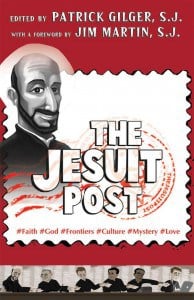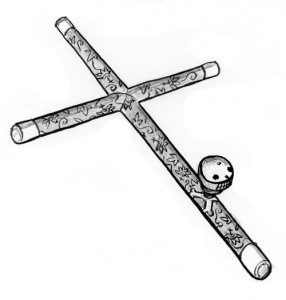|
This post is an excerpt from the new The Jesuit Post book, The book features 20 new essays from writers for The Jesuit Post, as well as reprinting a few of the best essays from our first two years online. For more information, click here. |
 |
Times are tough for Karl Marx, and not just because he’s been dead for over a hundred and thirty years. As the nations most directly influenced by his thought have foundered (Cuba), collapsed spectacularly (the USSR), or backed slowly away from outright communism (China), a good number of his ideas seem to live only in the tattered copies of The Marx-Engels Reader sold in college bookstores. A good number, but not all.
Even if fewer and fewer living souls still think that communism is the destination of our relentless economic march, Marx’s most famous dictum — that “Religion is the opium of the people”1 – is still alive and kicking. Maybe more so today than when he first committed it to paper. In fact, due in no small measure to its delicious pithiness, “religion as opiate” remains one of the handiest definitions of religion around. It’s one of those phrases that I’ve heard so many times that I can’t even remember exactly where I first heard it.

God, Religion and Other Drugs
Though I can’t place my first exposure to the idea, I still remember my initial reaction to it, which remained consistent through my undergraduate career: resistance, of a strongly dismissive type. I’ve spent a good bit of time trying (without success) to recall exactly what it was that I jotted in the book’s margin upon stumbling upon the storied passage. “Ha!” or “Please!” would have been too tame. I’m an active and at times aggressive reader, so it’s a fair bet that an expletive may have been involved. You get the picture.
But unlike its companions in the landfill of ideas I’ve encountered and quickly discarded, Marx’s quip has had considerable, albeit intermittent, staying power. Like a specter from the film “Ghostbusters,” it returns to slime me just when I least suspect it. This is because it’s a colorful, provocative image for thinking about faith — even for a believer such as myself.
So even as college has become grayer and grayer in my memory, Marx’s dictum has remained in bold color. It’s taken me some time to puzzle out why, but I think I finally have a read on it: it stays with me because the content as well as the context of the quote give me pause. Marx wrote the passage specifically because he was concerned about religion’s capacity to dull the pain of existence among the exploited working and lower classes of his day. This anesthesia, he thought, tempered their zest for overthrowing the forces that oppressed them, the upshot being that religious types favored apparent happiness over the real deal. As one generally opposed to oppression, and as one familiar with the phrase “Pay, Pray, and Obey,” you can see why this strikes a nerve in me.
Better still, you don’t have to be a Marxist to think he’s right. I’ve met my share of tried-and-true capitalists who hold basically the exact same position, viewing religion as little more than magical thinking. Oxycodone for the soul. A little pill of false hope ingested to numb the pain of life with the promise of happiness eternal.
If Marx is right, then I — and a lot of people I know and love — long ago sailed past recreational usage into full-blown addiction. Probably because of the implication that I am accidentally drug-addled, I have spent a good deal of time thinking about this analogy. And despite my initial resistance to the notion of religion-as-opiate, after pondering it I had to admit (reluctantly) that there may actually be a problem here. What if he was right?
There is one reason why I remain unconvinced that religion is primarily a means of soothing the pain of life, that by believing we become somehow inoculated against pain. It’s that, if numbing the pain is what religion is supposed to do, I’m faced with a rather sharp question: what am I doing wrong?
I am a “Cradle Catholic,” and a Jesuit to boot. I live a religious life, in multiple senses of the word. But religion has not been a duller of pain for me. Or at least not only so. And yet there’s something in Marx’s accusation that remains true. It’s the persistent strangeness of this fact that has lead me to think that Marx’s metaphor possesses a rare trait: it’s both transparently false and unwittingly true at the same time.

“Poppies. Poppies will put them to sleep.”
What do I mean, then, when I claim that religion-as-opiate is transparently false? Two things. First, I mean to recognize that, for every pain religion assuages, every ray of hope it offers, it also brings its share of coldness into our world.
This is a less-than-comfortable fact for those of us who profess to be religious. It should be.
I am not even talking about remarkable instances of hardship born of religion, the kind that eventually (and apologetically) make their way into our history books: Crusades, Inquisitions, coerced conversions. There is pain aplenty in much more anonymous sufferings: the suffering of the vulnerable youth whose trust in a minister of God is met only with the shattering betrayal of abuse and a possible lifetime of trauma. The suffering of a woman who feels called to ministry in a congregation and yet is barred from it. The suffering of those who, because of their support of the unborn and unwanted, feel dismissed by cultural elites and intellectual debutantes. The suffering of a gay person who discovers that the supposedly unconditional love of God comes with considerable fine print. The suffering of those who are persecuted for the sheer fact that they practice a religion at all.
Someone may wish to tell them that religion takes away their pain. I am not that person. All too often it does nothing of the sort. What kind of person, I want to ask the shade of Marx, has any use for an opiate that doesn’t anesthetize?
The second transparent problem with the religion-as-opiate idea is that… how to put this… it under-describes what’s there to be seen in the world around us. Put differently, even if religious belief can push people into a kind of “holy flight” from the world’s troubles, the opposite is also the case. For many people, Christians among them, religion prompts deeper engagement with the world, and at places so staggeringly painful that there is no proper relief, medical or otherwise, from the trauma it such engagement can cause.
A woman in Calcutta, moved by the plight of the poor and the love of Christ, who cares for the dying and orphaned, the crippled and destitute. A man who asks to go to the poorest parish in Los Angeles, sharing life and kinship with gang members trapped in spirals of violence. A college professor who leaves a tenured position at a cushy American university to replace one who was assassinated for standing with the poor in El Salvador. A religious sister in Philadelphia who stands at the bedside of a comatose young man, whom she does not know, because it is from that vantage point that the Gospel makes sense to her.
You see what I’m driving at. The ideas that are the beating heart of Christianity — compassion and mercy, to say nothing of Incarnation — are as likely to throw believers headlong into the world as vice versa. And this world remains a place where pain and providence, suffering and salvation cohabitate.
Of course this is not all of religion. Yes, it leaves out some nasty preachers and judgmental congregations who, no matter how tiny their numbers, become the faces of Christianity in an image-driven culture. It overlooks the ever-rising tide of historical atrocities perpetrated under the banners of religious faith. And it sidesteps a fair number of theologians who seem to think that God must be small enough to dance on the head of a pin.
Yes, it may not be all of religion. But is it not the best of it?

Malyshev Maksim via Shutterstock
One of the properties of an opioid is that it is highly addictive, so addictive in fact that the person who stops using is consumed in a hell of withdrawal.
I took my first hit when I was twenty. It was just before my junior year in college, and I was on a silent retreat. If I could describe what happened more clearly I would, but precision fails me here. (Such are the perils of trying to write about the ineffable.) Suffice it to say that over the course of those few days I felt the immanence and embrace of an overwhelming love. It was a kind of love that, against all of my presuppositions and even preferences, touched parts of my life that I had long hidden. It named even these lovable.
I recognized this Love immediately and intuitively as the Mystery that we call God. And for as much as I craved this kind of acceptance — gasped for it, really — I also resisted it. Ever ready to set boundaries on God’s love, especially for myself, I found it almost unseemly or repugnant to be embraced so wildly, unreservedly. Yet so I was. Lucky for me, God is far less zealous than I am in protecting his honor.
Did this hit produce a high? You bet your ass. But it was not sheer comfort. Conversion, even aided by grace, rarely is. This experience called me to more authentic relationships of all kinds. It did not so much pull me out of the world as thrust me into it. To repurpose a line by the poet Spencer Reece, “All I know now/ is the more he loved me the more I loved the world.”2
That high lasted for a long time, and in its wake I began to make some painful (not to mention important) decisions, most of which were another reminder that religion is a poor opiate. It was this experience that brought me back to the religious faith of my childhood, with all its beauty and blemish. It was after that moment that I first began seriously considering a Jesuit vocation, a call whose inklings I had long resisted. But all of a sudden it seemed a very practical way to incarnate the Love I had come to know. Years later, here I am.
* * *
With time the initial intensity of encountering the Divine has waned. In recent years, in fact, there have been times when God has seemed at best hidden and, at worst, notable only by absence. I have learned that what was once present as a stunning, scalding light can indeed be reduced to a flicker. There is a profound disorientation that accompanies this return to ordinary time, to say nothing of the hunger and almost visceral yearning for the absent to be present once more.
It is here, on the other side of this barren circle of dependence and withdrawal, that I’ve come to see more than falsity in Marx’s analogy. He was right, in a way; there is something addictive about religion. Call it “spiritual,” call it “mystical,” call it whatever the hell you like, but it points to the belief that we can actually come to feel God’s presence, to know God. To speak in the dialect of Ignatian spirituality for a moment, we can relate to God even “as one friend does to another.” The flip side of this is that there is such a thing as spiritual withdrawal. I’ve seen it in others; I’ve felt it myself.
I don’t use the language of addiction glibly. It really is the only analogy capable of capturing the experience of craving something that will destroy you, even though in this instance the “you” destroyed is the false self. What’s remarkable, to me at least, is that it means that there are times when this God is known most acutely in absence — that feeling of something or someone once there, but present for now only as longing, desire, thirst.
Most likely Marx, at this point, would accuse of me speaking in riddles. I would like to assure him (and you, dear reader) that I am not. Those who have endured the loss of a beloved — to death or the breakdown of a relationship — know this present absence all too well. So does the poet Marie Howe. Though she might bristle at being called a “religion addict,” her slight, four-verse poem “Annunciation” captures the experience I’m identifying better than my prose. It begins:
Even if I don’t see it again — nor ever feel it
I know it is — and that if once it hailed me
it ever does —
It’s in the aching that the absent one is present, sometimes even more vividly than when they were close at hand. And in the absence something is there, something real. Yet we sense it strangely, in the vacant contours of the space it once occupied.
Masters of the spiritual life have filled books reflecting on this experience, offering suggestions for how to handle times when the thousand watt bulb of God’s light seems to burn out with a pop and a hiss. Some are more helpful than others. Their focus is usually on regaining the high, on flooding the soul with light once more. Mostly the emphasis is on waiting and patience and persistence. On angling ourselves back towards God once more. Howe continues:
And so it is myself I want to turn in that direction
not towards a place, but it was a tilting
within myself,
The idea I want to contribute is simply this: even when the feeling’s gone, and even if it never returns, it is still there. We know it by our longing, by the void left behind. It’s in this sense that Marx was right: to be religious is to be a kind of addict, and forever.
as one turns a mirror to flash the light to where
it isn’t — I was blinded like that — and swam
in what shown at me
only able to endure it by being no one and so
specifically myself I thought I’d die
from being loved like that.
An addict, that is, for whom nothing can ever be the same again.

– — – — –